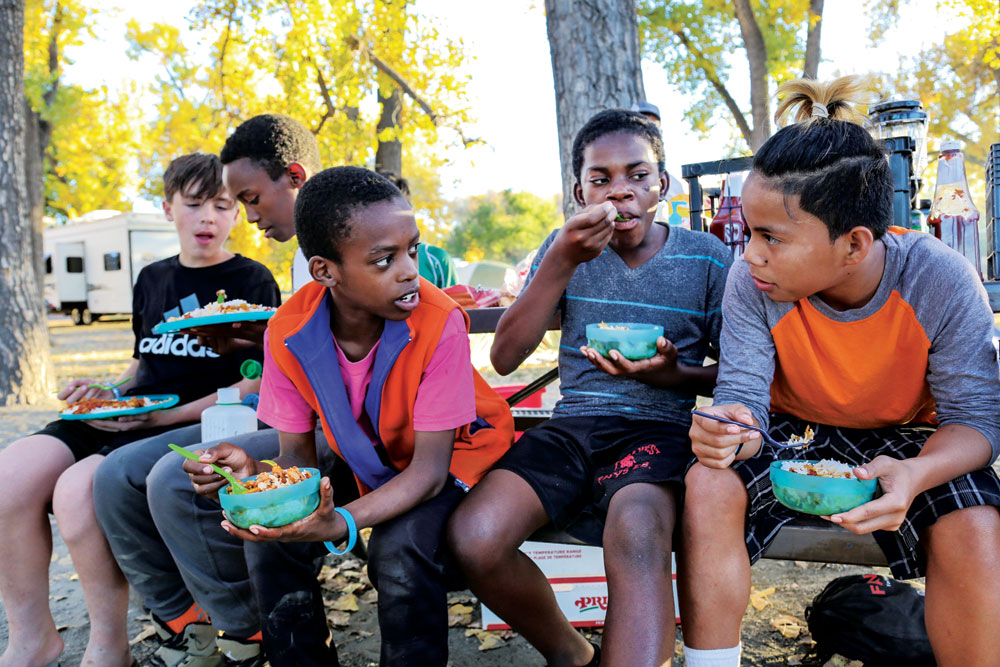
Isaac Philip, Jean Tuyishime, Moise Tuyikunde, Mbelchi Justin and Tenson Sangaua eat a meat and rice dish they prepared themselves.
The Boy Scouts of Troop 1532 enjoy laughter-filled monthly campouts, learn scouting skills, and even go to summer camp. Nearly all of them are refugees, however, and their backgrounds and resources are far different than those of their American-born counterparts.
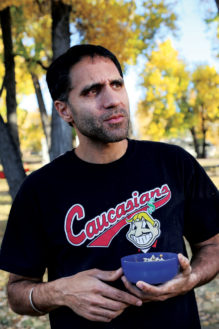
Scoutmaster, Dr. PJ Parmar
Dr. P.J. Parmar, scoutmaster, recalled their first campout about two years ago. “A few of our Burmese kids pulled out a slingshot and immediately shot a bird and a squirrel, skinned them, gutted them, roasted them, and served them up with their noodles. This whole thing took minutes,” he says, “I never would have seen that in a classic American Boy Scout troop; the kids would be too scared or queasy, or it would be a novelty. There was nothing novel about what these guys were doing. This was everyday activity.” The boys had learned to hunt like this in their home country, an outdoor survival skill without a merit badge that they continued behind their Denver apartment complex.
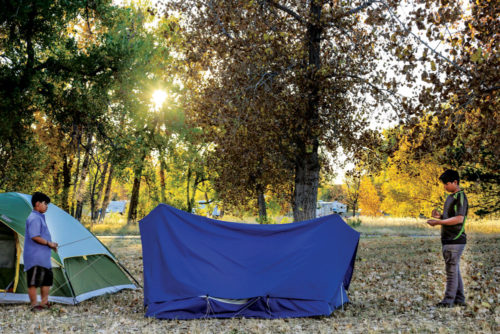
Hassyim Salimullah (left) and Alam Salimullah set up their tents.
About 50 boys ages 11 to 15 are active in Troop 1532. The scouts typically hail from places that send Denver refugees, particularly Nepal, Burma (Myanmar) and the Congo/Rwanda area. Some have been in the States only a few months, some as long as eight years, and most come from tough backgrounds. “Most of these kids were born in the refugee camps; some from generations of poverty and trauma,” says Parmar, “Maybe a boy has food now, but maybe he didn’t for his first 12 years.”
The boys find the troop through the Ardas Family Medicine Clinic, founded five years ago by Parmar. The clinic and the troop are located at “Mango House” in northwest Aurora, a center for refugee services that Parmar has established without government or nonprofit funding. A former Eagle Scout, Parmar felt a Boy Scout troop would provide newly arrived boys “a way to go play in the woods or in the mountains, an opportunity to get out of their house, get out of the neighborhoods where they’re living.” The camaraderie, skill building and recreational activities of scouting offer relief from often difficult living conditions—both past and present.
Justin Wilson, a former Eagle Scout, helps Parmar run the troop. Wilson came to Troop 1532 last year through his connection with Scouts for Equality, an organization that advocates for inclusion, mutual respect and equal treatment within Boy Scouts of America (BSA). A Boulder resident and the executive director of Scouts for Equality, Wilson is an integral part of the troop, coordinating campout sites, transporting scouts and supervising campouts.
Troop 1532 differs in resources from many of its peers. While the BSA provides free registrations and summer camp, and Parmar funds the monthly campouts, volunteer help is an ongoing need.
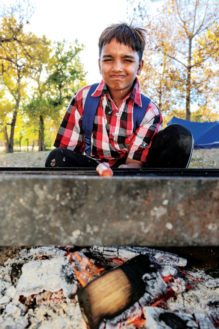
Nur Salimullah squints in reaction to smoke in his eyes.
One sunny October afternoon at Cherry Creek State Park, the troop had set up their tents, a hodge-podge of two- and three-person affairs, and was cooking dinner and joking around like typical teenagers. A few sites away, an American flag billowed impressively in front of a huge, white canvas pavilion, set up by a different Boy Scout troop and their many parent volunteers.
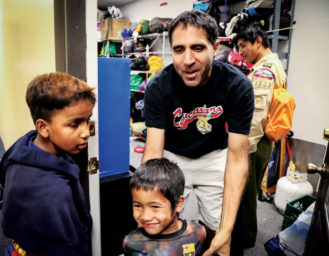
Parmar consoles a future scout who wants to go on the trip, explaining he’s too young.
Due to their hectic lives, few parents volunteer with Troop 1532. Adult volunteers are needed, particularly ones who can drive and help with the campouts on weekends.
“A lot of troops, their biggest limiting factor is that they can’t recruit kids. They have plenty of adults; way more dads than they would need,” says Wilson. “Our problem was we didn’t have any adults, except for us. We had more than enough kids.” Fortunately, several volunteers have recently joined the troop, including Michael Philip, whose son Isaac is the first American member of the troop, and Bill Sassani, an old scouting friend of Parmar’s.
But the lack of adults enables the scouts of Troop 1532 to develop self-sufficiency, as evidenced by their campout dinner. The scouts cooked the meal, a mash-up of traditional and nontraditional campout foods (and no wild game this time). They prepared hot dogs (“Make sure the Hindu kids get the pork ones and Muslims get the beef,” advised Parmar), Burmese tea leaf salad, ramen with vegetables and eggs, and chatpate, a spicy-sour Nepali dish of puffed rice and vegetables.
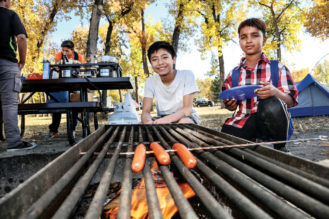
Chitsan Win and Nur Salimullah watch over the hot dogs, pork for the Hindu kids and beef for the Muslims, says Scoutmaster Dr. P.J. Parmar.
After dinner, the scouts had a plan: “We’re going to wander over to the other troop’s tent and see if we can challenge them to a soccer game,” says Wilson. “I don’t think we’ve ever found a troop that could beat us in soccer.”
Find “Troop 1532” on Facebook and learn more about Mango House at http://1532galena.com.
Rare Opportunity to Enjoy Burmese Food
Support Burmese Culture with a 5-Course Feast Sat., Nov.12, 6–9pm
Spring Institute, 1373 Grant St.
Tickets at www.fooition.com



0 Comments